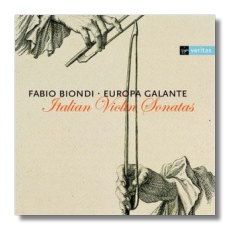
The Internet's Premier Classical Music Source
Related Links
-
Geminiani Reviews
Locatelli Reviews
Tartini Reviews
Veracini Reviews - Latest Reviews
- More Reviews
-
By Composer
-
Collections
DVD & Blu-ray
Books
Concert Reviews
Articles/Interviews
Software
Audio
Search Amazon
Recommended Links
Site News
 CD Review
CD Review
Italian Violin Sonatas

- Francesco Maria Veracini: Sonata prima in G minor, Op. 1 #1
- Pietro-Antonio Locatelli: Sonata per violino e basso in D minor, Op. 6 #12
- Michele Mascitti: Psyché, Op. 5 #12
- Francesco Xaverio Geminiani: Sonata in A minor, Op. 4 #5
- Giuseppe Tartini: Sonata in G minor, Op. 2 #1
Fabio Biondi, violin
Maurizio Naddeo, cello
Giangiacomo Pinardi, theorbo, baroque guitar, cittern
Sergio Ciomei, harpsichord, organ, gravicembalo, clavichord
Virgin Veritas 45588 DDD 70:26
Fabio Biondi and his ensemble Europa Galante might be thought of as the young Italian cousins to Reinhard Goebel and Musica Antiqua Köln. In both cases, they are masterminded by a violinist whose specialty is Baroque performance practice, and whose extra talent is gathering other talented musicians around him. Goebel and MAK have made their share of eyebrow-raising recordings. (Their Bach Brandenburgs contains some of the fastest tempos known to man!) Today, Biondi and Europa Galante stir things up in much the same way – hear their Virgin Veritas recording of Vivaldi's Opus 8.
Here is an example of Biondi scaling things back, just as Goebel liked to do from time to time. "Europa Galante" is credited on the cover, but here this ensemble is represented here by just three musicians, who of course form the continuo. As Baroque manuscripts seldom specific exactly which instruments the composer had in mind, Biondi has aimed for variety in timbre – look at the number of instruments listed above. The results are attractive, and as a consequence, it is possible to play this CD straight through without fatiguing one's ears.
The repertoire is varied too. Although these are "Italian Violin Sonatas," one would guess one was hearing the work of a Frenchman in Michele Mascitti's Psyché, a divertissement in ten tableaux written in 1714. As a matter of fact, Mascitti, a Neapolitan, came to Paris a decade earlier and changed his given name to Michel. There's no evidence that he specifically wrote this work for Versailles, although it certainly would have been welcomed there. It turns out Geminiani was no stranger to Paris either, although the sonata presented here is far less typical of French style.
I have a CD of Nathan Milstein playing similar repertoire. It was recorded in the late 1950s, and how times have changed. Milstein is accompanied by a piano, and he plays everything in his inimitably warm and refined style. One would never mistake Biondi for Milstein. Biondi's playing is brilliant, bracing, and, when the occasion allows it, a little bit rude. It's exciting stuff, and it has nothing of the museum about it. This disc will appeal primarily to those interested in the Italian Baroque, and only secondarily to fiddle fanatics, who tend to prefer their musicianship more plush and rounded. Who knows, though – they might be pleasantly shocked to hear Biondi and his compatriots shoot sparks like this.
This disc was recorded in Parma in September 2002, and the intimate, lively sound is just right for the music and the performances.
Copyright © 2003, Raymond Tuttle


















